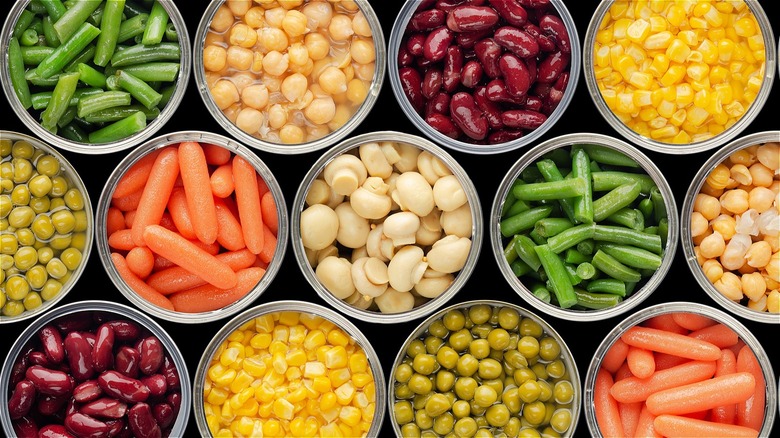Canned vegetables are a staple in many households. They offer convenience, a long shelf life, and a quick way to add nutrition to meals. But the question remains: are canned vegetables healthy? In this comprehensive guide, we’ll explore the nutritional value of canned vegetables, their benefits and drawbacks, and how they compare to fresh and frozen options.
Understanding Canned Vegetables
Canned vegetables are preserved in a can along with water, salt, or other preservatives. The canning process involves heating to kill bacteria, which helps prevent spoilage. But how does this affect their health benefits? Let’s break it down.
Nutrient Preservation
- Nutrient Retention: The canning process can preserve many nutrients. For instance, canned tomatoes retain a significant amount of vitamin C and lycopene, an antioxidant.
- Shelf Stability: Canned vegetables are often more stable than fresh ones. They can last for years without spoiling, making them a great option for emergencies.
| Nutrient | Canned Vegetables | Fresh Vegetables | Frozen Vegetables |
|---|---|---|---|
| Vitamin C | Moderate | High | Moderate |
| Fiber | Moderate | High | High |
| Antioxidants | High | Variable | High |
| Shelf Life | Years | Days to Weeks | Months |
The Benefits of Canned Vegetables
Canned vegetables are convenient and can be a healthy addition to your diet. Here are some of their key benefits:
- Convenience: Canned vegetables are pre-cooked and ready to eat. This saves time in meal preparation, making it easier to incorporate vegetables into daily meals.
- Cost-Effective: They are generally less expensive than fresh produce, especially during off-seasons. Canned vegetables can help you stick to your budget while still getting your daily servings of veggies.
- Nutritional Value: Many canned vegetables maintain a good level of nutritional value. Canned beans, for example, are an excellent source of plant-based protein and fiber.
- Variety: Canned vegetables allow you to enjoy a wide range of veggies year-round, regardless of seasonal availability. From corn to spinach, the options are extensive.
- Reduced Food Waste: With a long shelf life, canned vegetables help reduce food waste. You can use them when you need them without worrying about spoilage.
Disadvantages of Canned Vegetables
Like anything, canned vegetables have their downsides. Let’s examine some of the potential concerns.
- Sodium Content: Many canned vegetables are high in sodium, as salt is often added as a preservative. High sodium intake can lead to health issues such as hypertension.
- BPA Concerns: Some cans are lined with BPA (bisphenol A), a chemical that may leach into the food. Though many brands are moving away from BPA, it’s essential to check the labels.
- Texture and Flavor: Canned vegetables may have a different texture and flavor compared to fresh or frozen options. They can be softer and less vibrant, which may not appeal to everyone.
- Limited Nutritional Changes: While many nutrients are retained, the process of canning can reduce some vitamins. For example, certain B vitamins may diminish during processing.
Canned vs. Fresh vs. Frozen Vegetables
To understand if canned vegetables are healthy, it’s crucial to compare them with fresh and frozen vegetables. Each option has its pros and cons.
Nutritional Comparison
| Vegetables Type | Nutritional Quality | Shelf Life | Preparation Time | Cost |
|---|---|---|---|---|
| Canned | Good (varies) | Years | Minimal | Low |
| Fresh | Best (if seasonal) | Days to Weeks | Moderate | Variable |
| Frozen | Good (close to fresh) | Months | Minimal | Moderate |
Fresh Vegetables
- Pros: Highest in nutrients, best flavor.
- Cons: Shorter shelf life, can be more expensive.
Frozen Vegetables
- Pros: Nutritional quality is often high, no added preservatives.
- Cons: May require more preparation than canned.
Tips for Choosing Healthy Canned Vegetables
If you’ve decided to include canned vegetables in your diet, here are some tips to make healthier choices:
- Read Labels: Look for options with no added sugars or preservatives. Opt for low-sodium or no-salt-added varieties.
- Choose BPA-Free Cans: Check for brands that use BPA-free linings to reduce chemical exposure.
- Opt for Whole Vegetables: Choose cans that contain whole vegetables instead of products with added sauces or seasonings that can increase unhealthy ingredients.
- Balance Your Diet: Combine canned vegetables with fresh and frozen options for a varied diet.
Popular Canned Vegetables
| Vegetable | Health Benefits |
|---|---|
| Tomatoes | High in vitamin C and lycopene; good for heart health. |
| Green Beans | High in fiber and low in calories; supports digestion. |
| Corn | Provides antioxidants and essential vitamins. |
| Peas | Rich in protein and fiber; supports muscle growth and digestion. |
Real-Life Examples
Cooking with Canned Vegetables
Many people wonder how to use canned vegetables effectively. Here are some delicious and simple recipes:
1. Canned Vegetable Soup
- Ingredients:
- 1 can of mixed vegetables
- 1 can of diced tomatoes
- 4 cups of vegetable broth
- Spices (salt, pepper, basil)
- Instructions:
- Combine all ingredients in a pot.
- Bring to a simmer for 15 minutes.
- Serve hot.
2. Canned Veggie Stir-Fry
- Ingredients:
- 1 can of green beans
- 1 can of corn
- 2 cups of cooked rice
- Soy sauce and sesame oil
- Instructions:
- Heat oil in a pan.
- Add all vegetables and stir-fry for 5-7 minutes.
- Serve with rice and soy sauce.
Are Canned Vegetables Healthy for Weight Loss?
Canned vegetables can be a healthy option for weight loss when incorporated into a balanced diet. They are often low in calories and high in fiber, which helps you feel full and satisfied. Unlike processed snacks, canned veggies provide essential nutrients without added sugars or unhealthy fats. However, it’s crucial to choose varieties that are low in sodium and free from preservatives. Incorporating canned vegetables into meals, such as soups and stir-fries, can boost nutrient intake without significantly increasing calorie consumption. Overall, they can be a convenient and nutritious addition to a weight loss plan.
The Bottom Line
So, are canned vegetables healthy? The answer is yes, with some caveats. They are a practical and nutritious option that can complement a balanced diet. By choosing low-sodium options, checking for BPA-free cans, and integrating them with fresh and frozen produce, you can enjoy the benefits of canned vegetables without compromising your health.
Final Thoughts
Canned vegetables are not just a backup plan; they can be a healthy and delicious part of your meals. Emphasizing variety and balance is key. With the right choices, you can enjoy all the convenience that canned vegetables offer without sacrificing nutrition. So, next time you’re at the store, don’t hesitate to grab a few cans!
Being well-informed and making conscious choices will lead to a healthier lifestyle, one meal at a time.


